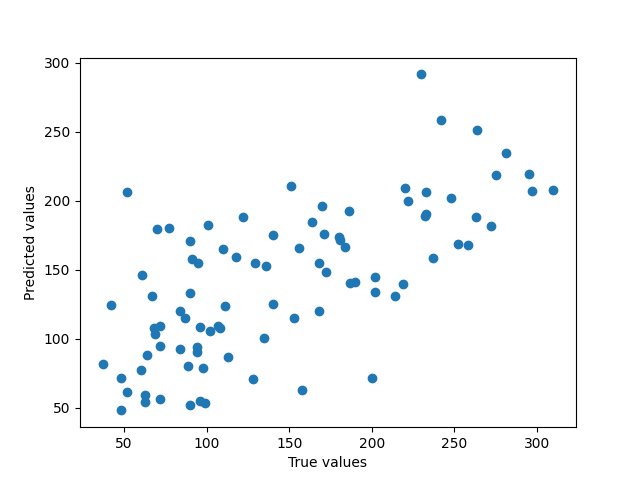Note
Go to the end to download the full example code
Tabular Regression with scikit-learn
This example shows how you can create a Hugging Face Hub compatible repo for a tabular regression task using scikit-learn. We also show how you can generate a model card for the model and the task at hand.
Imports
First we will import everything required for the rest of this document.
from pathlib import Path
from tempfile import mkdtemp, mkstemp
import matplotlib.pyplot as plt
import sklearn
from sklearn.datasets import load_diabetes
from sklearn.linear_model import LinearRegression
from sklearn.metrics import mean_absolute_error, mean_squared_error, r2_score
from sklearn.model_selection import train_test_split
from sklearn.pipeline import Pipeline
from sklearn.preprocessing import StandardScaler
import skops.io as sio
from skops import card, hub_utils
Data
We will use diabetes dataset from sklearn.
X, y = load_diabetes(return_X_y=True)
X_train, X_test, y_train, y_test = train_test_split(
X, y, test_size=0.2, random_state=42
)
Train a Model
To train a model, we need to convert our data first to vectors. We will use StandardScalar in our pipeline. We will fit a Linear Regression model with the outputs of the scalar.
model = Pipeline(
[
("scaler", StandardScaler()),
("linear_regression", LinearRegression()),
]
)
model.fit(X_train, y_train)
Inference
Let’s see if the model works.
y_pred = model.predict(X_test[:5])
print(y_pred)
[139.5475584 179.51720835 134.03875572 291.41702925 123.78965872]
Initialize a repository to save our files in
We will now initialize a repository and save our model
_, pkl_name = mkstemp(prefix="skops-", suffix=".pkl")
with open(pkl_name, mode="bw") as f:
sio.dump(model, file=f)
local_repo = mkdtemp(prefix="skops-")
hub_utils.init(
model=pkl_name,
requirements=[f"scikit-learn={sklearn.__version__}"],
dst=local_repo,
task="tabular-regression",
data=X_test,
)
if "__file__" in locals(): # __file__ not defined during docs built
# Add this script itself to the files to be uploaded for reproducibility
hub_utils.add_files(__file__, dst=local_repo)
Create a model card
We now create a model card, and populate its metadata with information which
is already provided in config.json, which itself is created by the call to
hub_utils.init() above. We will see below how we can populate the model
card with useful information.
model_card = card.Card(model, metadata=card.metadata_from_config(Path(local_repo)))
Add more information
So far, the model card does not tell viewers a lot about the model. Therefore, we add more information about the model, like a description and what its license is.
model_card.metadata.license = "mit"
limitations = (
"This model is made for educational purposes and is not ready to be used in"
" production."
)
model_description = (
"This is a Linear Regression model trained on diabetes dataset. This model could be"
" used to predict the progression of diabetes. This model is pretty limited and"
" should just be used as an example of how to user `skops` and Hugging Face Hub."
)
model_card_authors = "skops_user, lazarust"
citation_bibtex = "bibtex\n@inproceedings{...,year={2022}}"
model_card.add(
folded=False,
**{
"Model Card Authors": model_card_authors,
"Intended uses & limitations": limitations,
"Citation": citation_bibtex,
"Model description": model_description,
"Model description/Intended uses & limitations": limitations,
},
)
Card(
model=Pipeline(steps=[('scaler', Stan...r_regression', LinearRegression())]),
metadata.license=mit,
metadata.library_name=sklearn,
metadata.tags=['sklearn', 'skops', 'tabular-regression'],
metadata.model_format=pickle,
metadata.model_file=skops-h0sxly9z.pkl,
metadata.widget=[{...}],
Model description=This is a Linear Re...o user `skops` and Hugging Face Hub.,
Model description/Intended uses & lim... not ready to be used in production.,
Model description/Training Procedure/Hyperparameters=TableSection(12x2),
Model description/Training Procedure/...</div></div></div></div></div></div>,
Model Card Authors=skops_user, lazarust,
Citation=bibtex @inproceedings{...,year={2022}},
Intended uses & limitations=This mode... not ready to be used in production.,
)
Add plots, metrics, and tables to our model card
We will now evaluate our model and add our findings to the model card.
y_pred = model.predict(X_test)
# plot the predicted values against the true values
plt.scatter(y_test, y_pred)
plt.xlabel("True values")
plt.ylabel("Predicted values")
plt.savefig(Path(local_repo) / "prediction_scatter.png")
model_card.add_plot(**{"Prediction Scatter": "prediction_scatter.png"})
mae = mean_absolute_error(y_test, y_pred)
mse = mean_squared_error(y_test, y_pred)
r2 = r2_score(y_test, y_pred)
model_card.add_metrics(
**{"Mean Absolute Error": mae, "Mean Squared Error": mse, "R-Squared Score": r2}
)

Card(
model=Pipeline(steps=[('scaler', Stan...r_regression', LinearRegression())]),
metadata.license=mit,
metadata.library_name=sklearn,
metadata.tags=['sklearn', 'skops', 'tabular-regression'],
metadata.model_format=pickle,
metadata.model_file=skops-h0sxly9z.pkl,
metadata.widget=[{...}],
Model description=This is a Linear Re...o user `skops` and Hugging Face Hub.,
Model description/Intended uses & lim... not ready to be used in production.,
Model description/Training Procedure/Hyperparameters=TableSection(12x2),
Model description/Training Procedure/...</div></div></div></div></div></div>,
Model description/Evaluation Results=TableSection(3x2),
Model Card Authors=skops_user, lazarust,
Citation=bibtex @inproceedings{...,year={2022}},
Intended uses & limitations=This mode... not ready to be used in production.,
Prediction Scatter=PlotSection(prediction_scatter.png),
)
Save model card
We can simply save our model card by providing a path to Card.save().
The model hasn’t been pushed to Hugging Face Hub yet, if you want to see how
to push your models please refer to
this example.
model_card.save(Path(local_repo) / "README.md")
Total running time of the script: (0 minutes 0.434 seconds)